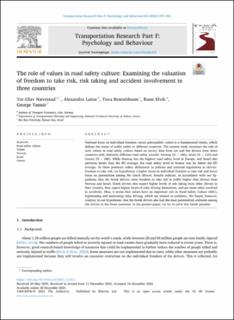| dc.contributor.author | Nævestad, Tor-Olav | |
| dc.contributor.author | Laiou, Alexandra | |
| dc.contributor.author | Rosenbloom, Tova | |
| dc.contributor.author | Elvik, Rune | |
| dc.contributor.author | Yannis, George | |
| dc.coverage.spatial | Norway, Oslo | en_US |
| dc.date.accessioned | 2023-06-20T10:15:45Z | |
| dc.date.available | 2023-06-20T10:15:45Z | |
| dc.date.created | 2022-01-03T09:01:57Z | |
| dc.date.issued | 2021-12-30 | |
| dc.identifier.citation | Transportation Research Part F: Traffic Psychology and Behaviour. 2021, 84 (Januar 2022), 375-392. | en_US |
| dc.identifier.issn | 1369-8478 | |
| dc.identifier.uri | https://hdl.handle.net/11250/3072247 | |
| dc.description | Tor-Olav Nævestad, Alexandra Laiou, Tova Rosenbloom, Rune Elvik, George Yannis, The role of values in road safety culture: Examining the valuation of freedom to take risk, risk taking and accident involvement in three countries, Transportation Research Part F: Traffic Psychology and Behaviour, Volume 84, 2022, Pages 375-392, ISSN 1369-8478, https://doi.org/10.1016/j.trf.2021.12.012 (https://www.sciencedirect.com/science/article/pii/S1369847821002904) | en_US |
| dc.description.abstract | National focus on individual freedom versus paternalistic values is a fundamental theme, which defines the status of traffic safety in different countries. The present study examines the role of such values in road safety culture based on survey data from car and bus drivers from three countries with distinctly different road safety records: Norway (N = 596), Israel (N = 129) and Greece (N = 386). While Norway has the highest road safety level in Europe, and Israel also performs better than the EU average, the road safety level in Greece was far below the EU average. As these positions reflect differences in policies and national regulations in drivers’ freedom to take risk, we hypothesize a higher focus on individual freedom to take risk and lower focus on paternalism among the Greek drivers. Results indicate, in accordance with our hypothesis, that the Greek drivers value freedom to take risk in traffic higher than drivers from Norway and Israel. Greek drivers also expect higher levels of risk taking from other drivers in their country, they report higher levels of risky driving themselves, and are more often involved in accidents. Thus, it seems that values have an important role in Road Safety Culture (RSC), legitimizing and motivating risky driving, which are related to accidents. We found, however, contrary to our hypotheses, that the Greek drivers also had the most paternalistic attitudes among the drivers in the three countries. In the present paper, we try to solve this Greek paradox. | en_US |
| dc.language.iso | eng | en_US |
| dc.publisher | Elsevier | en_US |
| dc.rights | Navngivelse 4.0 Internasjonal | * |
| dc.rights.uri | http://creativecommons.org/licenses/by/4.0/deed.no | * |
| dc.subject | Road safety culture | en_US |
| dc.subject | Values | en_US |
| dc.subject | Norway | en_US |
| dc.subject | Israel | en_US |
| dc.subject | Greece | en_US |
| dc.title | The role of values in road safety culture: Examining the valuation of freedom to take risk, risk taking and accident involvement in three countries | en_US |
| dc.type | Journal article | en_US |
| dc.type | Peer reviewed | en_US |
| dc.rights.holder | © 2021 The Author(s). Published by Elsevier Ltd. | en_US |
| dc.description.version | publishedVersion | en_US |
| cristin.ispublished | true | |
| cristin.fulltext | original | |
| cristin.qualitycode | 1 | |
| dc.identifier.doi | 10.1016/j.trf.2021.12.012 | |
| dc.identifier.cristin | 1973473 | |
| dc.source.journal | Transportation Research Part F: Traffic Psychology and Behaviour | en_US |
| dc.source.volume | 84 | en_US |
| dc.source.issue | Januar 2022 | en_US |
| dc.source.pagenumber | 375-392 | en_US |
| dc.relation.project | Norges forskningsråd: 250298 | en_US |

